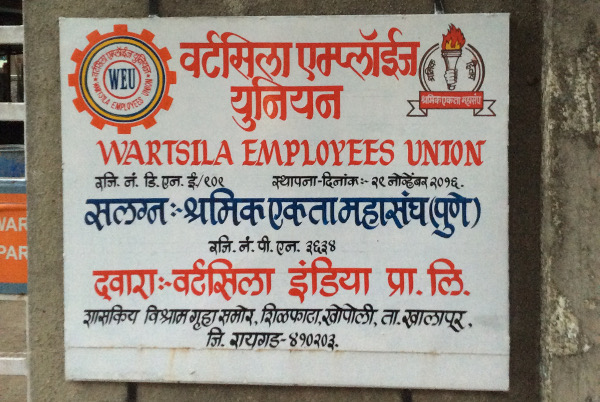- Details

PRESS RELEASE 17th October 2017
The follow-up report on Wärtsilä's corporate responsibility finds positive developments since Finnwatch’s previous 2015 report. However, more should be done to ensure a living wage and to monitor the supply chain.
Finnwatch’s follow-up report highlights the independent trade union at Wärtsilä’s Khopoli factory as the most significant improvement. The previous trade union was powerless, and it had been called to the factory by the management. The current trade union is officially registered and campaigns for matters the employees consider relevant.
– Labour rights at the factory are best achieved when employees can themselves monitor the realisation of their rights. The new union at Wärtsilä's Indian factory has intervened, among other things, in problems with overtime payment in previous years, says Finnwatch researcher Anu Kultalahti.
Finnwatch continues to laud Wärtsilä for its excellent level of occupational safety. The NGO is also pleased with Wärtsilä's openness during the research.
– Finnwatch was allowed into the factory to interview the employees, and there was a constructive dialogue with Wärtsilä, Kultalahti says.
However, some aspects in the company’s operations are less praiseworthy. Finnwatch continues to be critical about the low salaries of contract workers, who are not necessarily guaranteed a living wage. Contract workers with fixed-term contracts make up a large part of the factory’s workforce, and at the time of the research only half of the factory workers were in permanent employment.
Finnwatch also found that the monitoring of the company’s supply chain is still lax. In 2015, there were major problems with Wärtsilä’s Indian supplier's operations.
– After our first report, Wärtsilä audited the Indian supplier that Finnwatch had investigated, found serious problems, and reported trying to fix them. But the unwillingness of the supplier to change led to the cessation of trade relations, says Kultalahti.
Finnwatch however, urges Wärtsilä to take a more systematic approach to the assessment and control of risks pertaining to the supply chains.
– Wärtsilä says it will strengthen its supply base especially in Asia, but the company's assessment of human rights risks and monitoring of working conditions are still not transparent and credible.
Contact:
Anu Kultalahti
Researcher
+358 (0)44 719 3096






